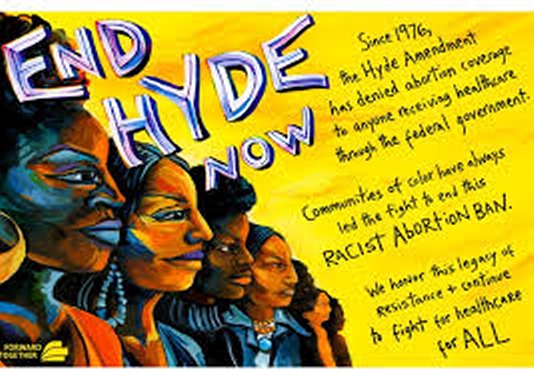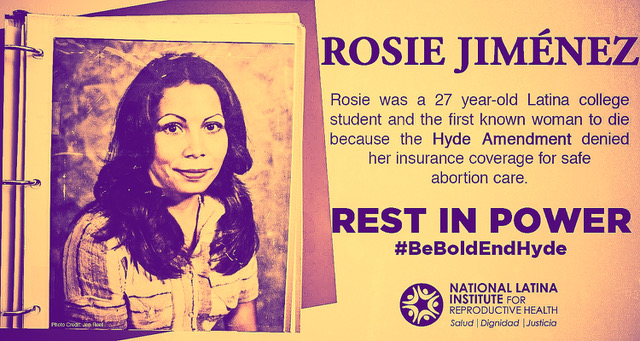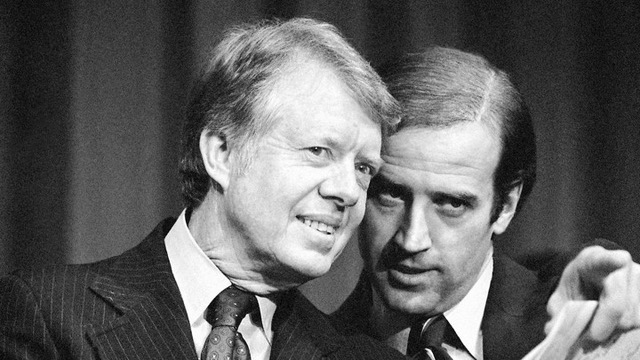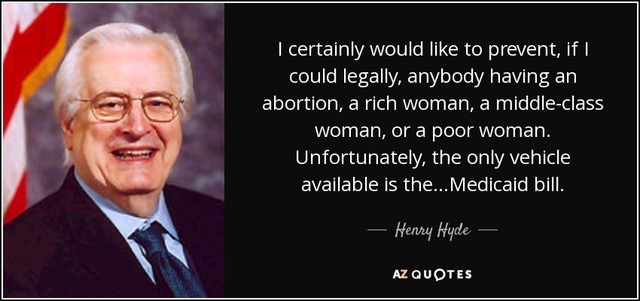The Verdict is in: Poor Women Aren’t Entitled to an Abortion

In case you haven’t noticed, abortion has become the talk of the town— at democratic presidential debates, in state legislatures (conservative states mostly), in the Supreme Court (the Court will hear a case from Louisiana challenging the credentials of doctors performing abortions), among legislators in Congress and in numerous polls of attitudes among the American people.
What’s all the fuss about? Since President Trump nominated, and aided by his Republican cronies in the Senate, successfully secured the appointment of two justices to the Supreme Court with a history of anti-abortion rulings, the 1973 Roe v. Wade decision legalizing abortion may be on the verge of extinction. Renewed scrutiny on this decision has brought well-deserved notoriety to a major failing of Roe that affects women too poor to pay for their abortions. “We have the constitutional right to abortion, but for many across the country, particularly individuals struggling to make ends meet, people of color, [and] young people, the access is really limited… the question is, what federal policies can you pass … to support access rather than just focusing on [if] you have that right itself? (Leila Abolfazli, National Women’s Law Center)”
In the tradition of U.S. law-making, whether tax policy or women’s healthcare, to the rich belong the goodies, the poor wind up out of the loop. That is why three years after the passage of Roe and 300,000 abortions later, in 1976, Republican congressman Henry Hyde had no trouble getting a majority of a solidly Democratic congress and a democratic president to approve a bill prohibiting federal insurance plans from covering abortions. Today over sixteen million women are unable to get their abortions covered under Medicaid.
There are two faces to the abortion debate — the legal argument for lawful abortions and the economic argument for affordable abortions. Roe v. Wade legalized abortion bringing it out of the shadow world of back street butchers and life-threatening do-it-yourself alternatives. That didn’t last long. With the advent of the Hyde Amendment, poor women once again found themselves at the mercy of shady abortion providers or life-threatening self-induced abortions.

The drive to preserve legal abortions has sucked most of the air out of any discussion of affordable abortions. Even democratic women in Congress have given short shrift to the desperate plight of poor women for whom legalization without affordability is meaningless. The Hyde Amendment, which must be authorized yearly, has always passed with flying colors even when the Democrats had the majority in both Houses and a Democrat in the White House.
To this day, Democrats continue to demonstrate the emptiness of their convictions. Here’s Nancy Pelosi, Speaker of the House, doing the usual Democratic two-step— “I do not think it [Hyde] is good public policy, and I wish we never had a Hyde Amendment, but it is the law of the land right now. I don’t see that there is an opportunity to get rid of it…” How about getting members of your caucus to vote it down and for once standing on principle?
There was one Democratic representative who tried to buck the establishment and strip Hyde out of this year’s funding bill. Speaker Pelosi and the other heavy hitters in the Democratic leadership squelched that effort. They were joined in this travesty by the major abortion right organizations, NARAL and Planned Parenthood.

Congress being only one-third of the government, how are abortion rights faring in the other branches of government? In the executive branch, three democratic presidents have held office since the Hyde Amendment was passed. Jimmy Carter, president when the bill was first passed, lectured poor women as he signed the bill— “As you know there are many things in life that are not fair, that wealthy people can afford and poor people can’t have.
Next up, Bill Clinton who campaigned against Hyde until he became president and reauthorized the Hyde Amendment eight times. Later Democratic presidential losing candidates including Al Gore, John Kerry and Hillary Clinton made the same bankrupt promises.
How about Barack Obama, America’s Nobel Peace Prize-winning President? Surely his experience as a community organizer gave him an up-close look at the catastrophic harm Hyde inflicts on poor women. Not exactly — “…I believe that women should have the right to choose. But I think that the most important thing we can do to tamp down some of the anger surrounding this issue is to focus on those areas that we can agree on. And that’s where I’m going to focus.”
The fix was in. Obama agreed to support Hyde in exchange for passage of his trophy legislation Obamacare. The deal included Executive Order 13535 guaranteeing “an adequate enforcement mechanism to ensure that federal funds are not used for abortion services consistent with a longstanding… restriction…the Hyde Amendment.

Branch number three, the judiciary, wasn’t going out of its way to make life easier for poor women either. In two major decisions, the all-male Court drew their own line in the sand. In Maher v. Roe, the majority of the Court ruled that the legalization of abortion “implies no limitation on the authority of the state to make a value judgment favoring childbirth over abortion and to implement that judgment by the allocation of public funds.” What else would you expect from a passel of old rich white men?
A year later in Harris v. McRae, the Court, in its befuddlement, sanctified the class-based argument that poor women have no legal right to affordable abortions using this tortured “logic” — “the Hyde Amendment leaves an indigent woman with at least the same range of choice in deciding whether to obtain a medically necessary abortion as she would have had if Congress had chosen to subsidize no health care costs at all.”
As we have seen, the Congressional Democrats have chosen to vote for Hyde year after year and hope nobody notices. But “the times they are a changing” as the conservative majority on the Supreme Court seems poised to cut into the protections embedded in Roe. Suddenly there is a new sheriff in town, the twelve Democrats vying for the top spot on the ticket and promising to end Hyde and “codify” Roe (make Roe federal law). How do the representatives and senators among the potential nominees, square their opposition with their voting records? “I believe that every single candidate for president who served in either the House or the Senate — every single one of them — voted for an appropriations bill that contains the Hyde Amendment,” (Rep. Hakeem Jeffries, House Democratic Caucus Chairman).
Trying to put the toothpaste back into the tube, Kamala Harris, Democratic presidential wannabee and official loudmouth on the subject of women’s rights —middle and upper class women that is —has come up with an excuse for her voting record that would be laughable if it weren’t so tragic —“Let’s be clear…the Hyde Amendment is the law. And so it has been attached to other funding bills, and until we repeal it, which is what I am in favor of, it will be attached to federal government funding bills… Logic like that makes a prima facie case for not choosing Harris as the Democratic nominee.
Perhaps there is a method to their unwillingness to give full-throated support to end this despicable curb on constitutional guarantees. Unlike other contentious issues, national healthcare, an end to student debt servitude and to colonial wars, that a majority of the public supports, government financing of abortion is not a crowd pleaser.
While Americans tend to be more liberal than their elected leaders on most social issues, federal funding for abortions is not one of them. In virtually every poll, when told that the Hyde Amendment “prohibits the use of federal funds to fund abortions except in the case of rape or incest or to save the life of the mother,” the majority of respondents are in full agreement. Even women do not favor using federal funds for abortions. A recent Harvard poll found that men and women in equal numbers support preserving Hyde.
Among Democrats who identify themselves as pro-choice, 66% of respondents in one poll agreed that “the decision on abortion should be made by a woman and her doctor,” but 55% of them did not want the funding to come from the federal government.
Perhaps it’s not Congress or the White House or the Judicial Branch where change needs to start. Perhaps it’s closer to home. The American people have always thought of themselves as generous and good-hearted. And in good times, there are numerous examples (which the mainstream media is quick to point out) of “ordinary” Americans risking their lives to save others. But these are far from good times for “ordinary” Americans. With almost half of Americans (44%) carrying expenses that exceed their incomes and relying on credit to make up the difference, almost three-quarters without health insurance or underinsured (74%) and 42% with no savings to get them through the “golden years,” frustration and anger replace the inclination to generosity.
The growing gap in wealth and income has a profound effect on Americans’ charitable instincts as a series of polls indicate. Among people who earn less than $50,000, 32% more respondents opposed federal funding for abortions than supported it. That margin of opposition was cut in half among those who made more than $50,000. Surprising? Not really when you consider that most Americans are one emergency away from bankruptcy. Unlike top tier households, they have no savings buffer. Americans in the bottom 40% income-wise have savings of between zero and $25,000.
It’s hard to feel charitable toward the less fortunate when you are one step away from joining them. Call it the corrosive effect of income inequality on the hearts and minds of the American people.
590 total views, 1 views today
